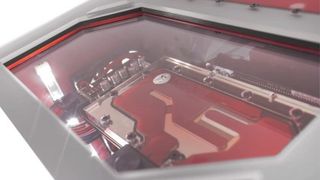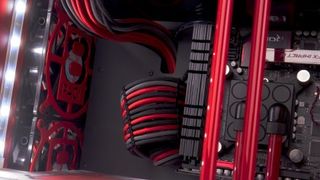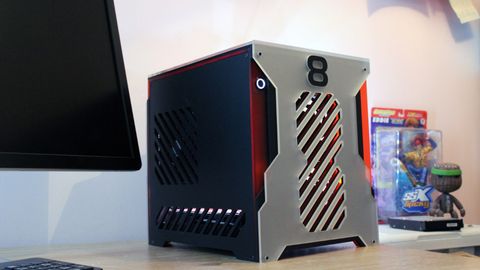Why you can trust TechRadar
It's no surprise that the Asteroid blitzed every benchmark. Its first graphics test came in 3D Mark's Fire Strike run, which is usually that app's toughest trial – but the Asteroid delivered a final score of 17,031 points.
That's just a little better than other recent gaming rigs. Take the affordable Asus ROG G20BM, which uses an AMD Radeon R9 390 card – in the same test it scored just 4,576 points.
Benchmarks
Here's how the Overclockers 8Pack Asteroid performed in our suite of benchmark tests:
- 3DMark: Cloud Gate: 36,271; Sky Diver: 38,781; Fire Strike: 17,031
- Cinebench R15: CPU: 1,034cb; Graphics: 185.1fps
- PCMark 8 (Home Test): 4,840
- GeekBench: 5,173 (single-core); 20,194 (multi-core)
- Metro: Last Light: 91fps (1080p, Ultra); 58fps(1440p, Ultra); 31fps (4K, Ultra)
- Middle Earth: Shadow of Mordor: 142fps (1080p, Ultra); 103fps (1440p, Ultra); 58fps (4K, Ultra)
- Bioshock Infinite: 180fps (1080p, Ultra); 125fps (1440p, Ultra); 65fps (4K, Ultra)
- GTA V: 147fps (1080p, Ultra); 118fps (1440p, Ultra); 57fps (4K, Ultra)
- Steam VR Bench: VR Ready. Zero frames below 90fps
That's a stonking start that carried on to real-world games tests. The Asteroid's poorest performance at 1080p came in Metro: Last Light, where it still delivered a 98fps average, and it wasn't much slower at 1440p. At that increased resolution the 8Pack's worst performance was still in Metro, but it still managed a stellar 58fps average – and its best result, in Bioshock, saw it zip through at 125fps.
It's no surprise, then, that the Asteroid won't struggle with 4K gaming. It ran Metro at 31fps and Middle Earth: Shadow of Mordor at 58fps, and was only one frame slower in GTA V at 3,840 x 2,160. As ever, Bioshock proved the easiest games test – and the Asteroid romped through at 65fps.

I've no qualms about this machine's gaming ability at 4K, and the sheer power on offer also means it'll cope with other high-end gaming tasks. It won't struggle with widescreen monitors, as their typical 3,440 x 1,440 resolution requires just over half the pixels of a 4K panel. And it's got the grunt for 4K, too – Valve's SteamVR benchmark saw the Asteroid rated as VR Ready, with no frames below 90fps.
And don't worry about games not looking their best, either: every one of our tests was conducted with our titles running at their Ultra graphics levels.
It's a clean bill of health for gaming, and the Asteroid impressed in CPU benchmarks too. In Geekbench's single- and multi-core tests the Asteroid scored 5,173 and 20,194 points, which are the fastest I've ever seen – they mean that no applications will prove too troublesome for this CPU.
The Asteroid looks good when lined up against rivals. In Cinebench's CPU test the Overclockers rig scored 1,034 points, which was almost 150 points ahead of the XMG Prime Overclocked Nvidia Edition – a $2,833 (about £2,000, AU$3,736) rig with an older Core i7 chip.

The incredible GPU and CPU are bolstered by decent storage. Samsung's 850 EVO returned sequential read and write scores of 493MB/s and 480MB/s – reasonable speeds that easily beat any normal hard disk. The drive is fast, but it can't compete with M.2 SSDs that use PCI bandwidth rather than SATA.
So far, so good – and I didn't encounter any heat or noise problems. Despite the huge overclocks and tiny build, the Asteroid's water-cooling kept the CPU and GPU chilled. The processor peaked at a reasonable 73°C, and the graphics card topped out at 55°C.
They're both excellent results, and machines will likely run cooler – I only hit those figures by stressing the silicon at 100% load for a prolonged period. The system was near-silent when idling, and not much louder during those stress-tests – its peak noise output was a subtle, low rumble. At a busy LAN event you just won't notice it, and it won't be audible at home during gameplay either.
Mike has worked as a technology journalist for more than a decade and has written for most of the UK’s big technology titles alongside numerous global outlets. He loves PCs, laptops and any new hardware, and covers everything from the latest business trends to high-end gaming gear.

